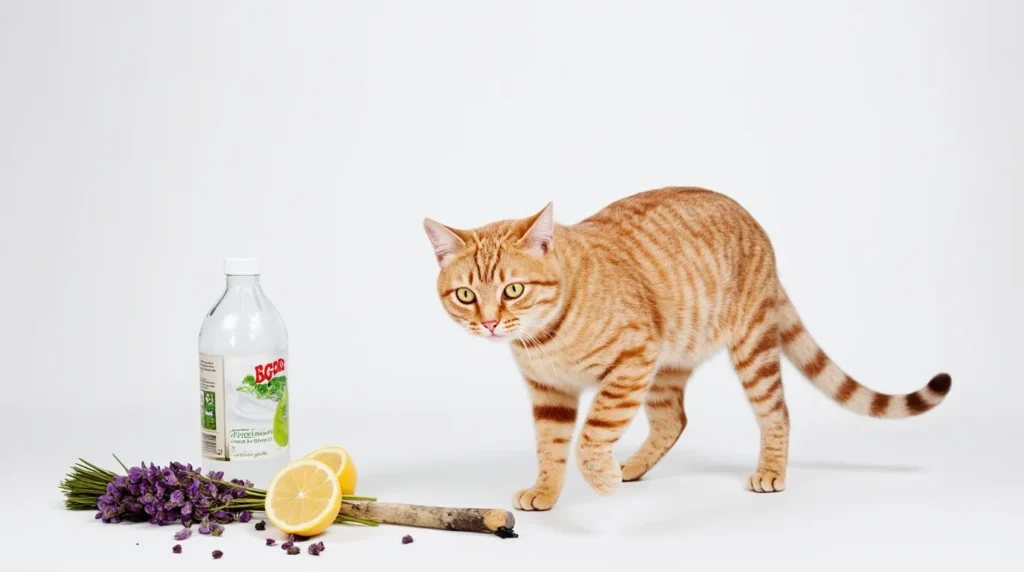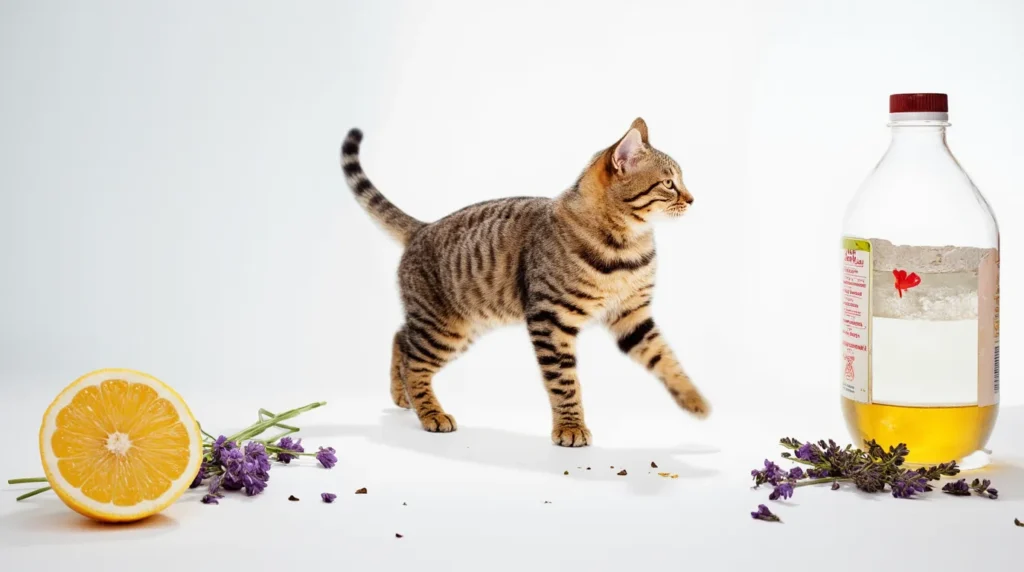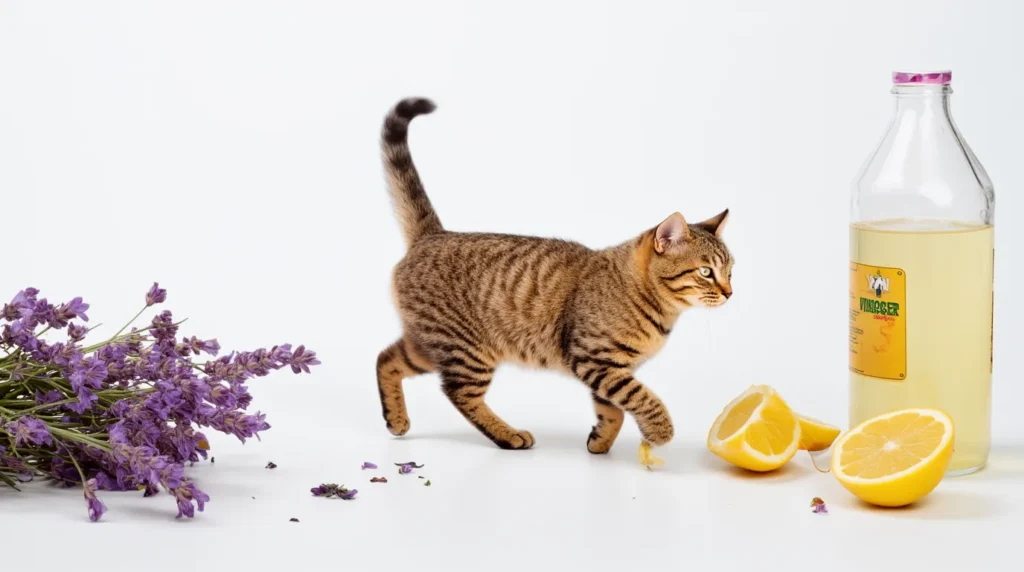Have you ever wondered what smell keeps cats away from your garden, furniture, or Christmas tree? If so, you’re certainly not alone. In fact, many homeowners and gardeners are constantly seeking effective ways to deter feline visitors. Fortunately, understanding what smells keep cats away can be a game-changer in creating cat-free zones without resorting to harmful methods.
The Feline Sense of Smell: Understanding What Smells Cats Hate to Keep Them Away
Before we dive into the specifics of what smell keeps cats away, it’s crucial to understand how cats perceive odors. Interestingly, cats have an incredibly powerful sense of smell. As a matter of fact, they possess about 200 million odor sensors in their noses, compared to a human’s mere 5 million. Consequently, this heightened olfactory ability means that cats are particularly sensitive to certain scents, which we can leverage to deter them from specific areas.
How Cats Use Their Sense of Smell and Why Certain Odors Keep Them Away
Cats, as it turns out, rely on their sense of smell for various reasons, including:
- Firstly, they use it for territory marking
- Secondly, it helps them in finding food
- Additionally, they identify other cats and animals through scent
- Moreover, they detect danger using their olfactory senses
- Lastly, it plays a crucial role in mating behaviors
Given this reliance on smell, it’s no surprise that certain odors can effectively keep cats at bay. Now, let’s explore what smells cats hate and how we can use this knowledge to our advantage in keeping them away.
What Smells Do Cats Hate? what smell keeps cats away
Cats have a natural aversion to several scents. Understanding these can help you create an effective deterrent strategy. Here are some of the most potent odors that typically answer the question “what smell keeps cats away?”:
1. Citrus Fruits: A Top Contender for What Smell Keeps Cats Away
One of the most well-known answers to “what smell keeps cats away” is citrus. The strong, acidic scent of lemons, oranges, and limes is often too much for a cat’s sensitive nose. To use this smell that keeps cats away, you can:
- Firstly, scatter citrus peels in your garden
- Secondly, use citrus-scented sprays on furniture or plants
- Lastly, apply essential oils of lemon or orange (diluted and used safely)
2. Herbs and Spices: Natural Odors That Repel Cats and Keep Them Away
Many herbs and spices that we find pleasant are offensive to cats. Some effective options that serve as smells cats hate include:
- Firstly, rosemary
- Secondly, thyme
- Thirdly, lavender
- Fourthly, rue
- Lastly, cinnamon
Planting these herbs in your garden or using their essential oils can create a natural barrier against feline intruders, effectively keeping cats away.
3. Coffee Grounds: An Unexpected Smell That Deters Cats and Keeps Them Away
Used coffee grounds not only serve as an excellent fertilizer but also act as a cat repellent. The strong smell of coffee is typically unappealing to cats. To use this smell that keeps cats away, simply sprinkle used grounds around plants or areas you want to protect.
4. Vinegar: A Pungent Odor Cats Hate That Keeps Them at Bay
While the pungent smell of vinegar might not be pleasant to humans either, it’s particularly effective at keeping cats away. In fact, a solution of vinegar and water sprayed around your property can serve as a powerful deterrent that keeps cats at bay.
5. Essential Oils: Concentrated Smells Cats Hate That Effectively Keep Them Away
Several essential oils are known to repel cats. However, it’s crucial to use them safely as some can be toxic to cats if ingested. Some effective options that answer “what smell keeps cats away” include:
- Firstly, peppermint oil
- Secondly, eucalyptus oil
- Lastly, tea tree oil (use with extreme caution)
Always remember to dilute essential oils and avoid direct contact with cats when using these smells that keep cats away.

What Smells Keep Cats Away from Christmas Trees? Holiday-Specific Solutions to Deter Cats
During the holiday season, many pet owners wonder what smell keeps cats away from Christmas trees. Here are some safe and effective options:
- Firstly, place orange peels around the base of the tree.
- Secondly, hang cinnamon sticks as ornaments.
- Thirdly, spray pine cones with a mixture of water and peppermint essential oil.
- Lastly, lightly mist the tree with a diluted vinegar solution.
Remember to keep all decorations and deterrents out of reach to prevent ingestion while effectively keeping cats away from your festive tree.
Get more details in our article where we discuss what smells keep cats away from Christmas tree ?.
Natural vs. Commercial Cat Repellents: Which Smells Keep Cats Away More Effectively?
When considering what smell will keep cats away, you might wonder whether to opt for natural or commercial solutions. Both have their pros and cons:
Natural Repellents: Harnessing Smells Cats Hate to Keep Them Away
Pros:
- Firstly, they’re eco-friendly
- Secondly, they’re often cheaper
- Thirdly, they’re safe for use around children and pets
- Lastly, they can be pleasant for humans
Cons:
- However, they may need frequent reapplication
- Additionally, their effectiveness can vary
Commercial Repellents: Engineered Odors That Effectively Keep Cats Away
Pros:
- Firstly, they’re often more potent and long-lasting
- Secondly, they’re specifically formulated for maximum effectiveness in keeping cats away
Cons:
- However, they can be expensive
- Additionally, they may contain harsh chemicals
- Lastly, some cats may become accustomed to the smell over time
Ultimately, the best choice depends on your specific situation and preferences. Many pet owners find success in combining both natural and commercial methods for optimal results in keeping cats away.
How to Use Smells to Keep Cats Away: Practical Applications of Odor Deterrents
Now that we’ve explored what smells keep cats away, let’s discuss how to effectively use these odors to protect your property:
1. Creating Scent Barriers: Leveraging Smells Cats Hate to Keep Them Out
To keep cats out of specific areas, create scent barriers using the odors they dislike. For example:
- Firstly, sprinkle coffee grounds or citrus peels around the perimeter of your garden.
- Secondly, place cotton balls soaked in essential oils near entry points.
- Lastly, use a spray bottle filled with a vinegar solution to mist problem areas.
2. Planting Deterrent Plants: Living Barriers of Smells Cats Hate to Keep Them Away
Incorporate plants that cats find unpleasant into your landscaping. Some options include:
- Firstly, Coleus canina (also known as the “Scaredy Cat Plant”)
- Secondly, lavender
- Thirdly, rosemary
- Fourthly, rue
- Lastly, lemon thyme
These plants not only serve as natural deterrents but can also enhance the beauty of your garden while keeping cats away.
3. DIY Repellent Sprays: Custom Blends of Odors That Keep Cats Away Effectively
Create your own cat repellent spray using natural ingredients. Here’s a simple recipe:
- Firstly, use 1 part vinegar
- Secondly, add 1 part water
- Lastly, include 2-3 drops of lemon essential oil
Mix in a spray bottle and apply to areas you want to protect. Remember to reapply after rain or every few days for best results in keeping cats away.
4. Strategic Use of Commercial Products: Maximizing Effectiveness of Cat-Repelling Odors
If you opt for commercial repellents, use them strategically:
- Firstly, apply to specific entry points or problem areas.
- Secondly, rotate different products to prevent cats from becoming accustomed to one scent.
- Lastly, follow the manufacturer’s instructions carefully for safe and effective use in keeping cats away.

The Science Behind Cat Repellent Smells: Why Certain Odors Keep Cats Away
Understanding the science behind what smell keeps cats away can help you use these deterrents more effectively. Cats’ aversion to certain smells is rooted in their evolutionary history and survival instincts.
Evolutionary Factors: The Origin of Smells Cats Hate That Keep Them Away
Many of the smells that repel cats are associated with potential dangers or discomfort in their natural environment. For example:
- Firstly, citrus fruits: The acidity in citrus can be irritating to a cat’s sensitive nose and potentially harmful if ingested in large quantities.
- Secondly, predator urine: Commercial repellents often mimic the scent of predator urine, triggering a cat’s instinct to avoid danger.
- Lastly, strong herbs: Some herbs have compounds that can be overwhelming or even slightly toxic to cats, leading to a natural aversion.
Olfactory Receptors and Sensitivity: Why Certain Smells Effectively Keep Cats Away
Cats have a highly developed olfactory system, including a special organ called the vomeronasal organ or Jacobson’s organ. This organ allows cats to “taste-smell” their environment, providing them with detailed information about their surroundings.
The heightened sensitivity of a cat’s nose means that smells we find pleasant or barely noticeable can be overwhelming or offensive to them. This is why even mild scents like lavender or rosemary can be effective deterrents in keeping cats away.
Potential Side Effects and Safety Considerations When Using Smells to Keep Cats Away
While using smells to keep cats away is generally safe, there are some important considerations to keep in mind:
1. Essential Oil Safety: Caution with Concentrated Odors That Keep Cats Away
Essential oils can be harmful to cats if they are swallowed or come into direct contact with their skin. Therefore, always use them diluted and in areas where cats cannot come into direct contact with them.
2. Allergic Reactions: Individual Responses to Cat-Repelling Smells
Some cats may have allergic reactions to certain plants or essential oils. Consequently, monitor for any signs of distress or allergic reactions when introducing new scents to keep cats away.
3. Environmental Impact: Broader Effects of Odor Deterrents That Keep Cats Away
Consider the impact of repellents on other wildlife and beneficial insects in your garden. Therefore, opt for cat-specific deterrents rather than broad-spectrum repellents when possible.
4. Humane Considerations: Ethical Use of Smells Cats Hate to Keep Them Away
While it’s important to protect your property, ensure that your deterrent methods don’t cause undue stress or harm to cats. Remember, the goal is to discourage them, not to punish them.
Alternative Methods to Keep Cats Away: Beyond Odor Deterrents
While odor-based deterrents can be highly effective, it’s often best to use them in conjunction with other cat-repelling methods for maximum effectiveness. Here are some additional strategies to consider:
1. Physical Barriers: Complementing Smells That Keep Cats Away
- Firstly, install fencing with rollers on top to prevent cats from climbing over.
- Secondly, use netting or chicken wire to protect specific plants or areas.
- Lastly, apply rough textures like pine cones or pebbles in garden beds to make them uncomfortable for cats to walk on.
2. Motion-Activated Deterrents: High-Tech Solutions for Keeping Cats Away
- Firstly, consider sprinklers that activate when motion is detected to startle cats and keep them away.
- Secondly, explore ultrasonic devices that emit high-frequency sounds that are unpleasant to cats but inaudible to humans.
3. Provide Alternative Spaces: Redirecting Cat Activity Away from Protected Areas
If neighborhood cats are the issue, consider creating a designated area in your yard where they are allowed. This can include:
- Firstly, a sandbox for them to use as a litter box
- Secondly, cat-friendly plants like catnip or catmint
- Lastly, comfortable resting spots away from your prized garden areas
By providing an attractive alternative, you may be able to direct cat activity away from areas you want to protect without relying solely on smells that keep cats away.

Frequently Asked Questions About What Smell Keeps Cats Away
To address some common concerns and queries about using smells to deter cats, let’s explore some frequently asked questions:
Q1: How long do cat repellent smells last?
A: The longevity of cat repellent smells varies depending on the method used. Natural repellents like citrus peels or coffee grounds may need to be replaced every few days, especially after rain. On the other hand, commercial sprays can last anywhere from a few days to a couple of weeks. Therefore, regular reapplication is key for continued effectiveness in keeping cats away.
Q2: Are there any smells that attract cats instead of repelling them?
A: Yes, certain smells can attract cats. These include:
- Firstly, catnip
- Secondly, valerian root
- Thirdly, fish or meat scents
- Lastly, cat pheromones (used in some cat products)
Knowing these can help you avoid accidentally attracting cats while trying to repel them with odors that keep cats away.
Q3: Can I use cat repellent smells indoors to keep cats away from certain areas?
A: Yes, many cat repellent smells can be used indoors. However, it’s important to use them safely and consider the comfort of human inhabitants. Some indoor-friendly options include:
- Firstly, citrus-scented air fresheners
- Secondly, lavender sachets
- Lastly, diluted essential oil diffusers (used with caution)
Always ensure good ventilation when using scents indoors to keep cats away.
Q4: Will these smells repel my own cat from certain areas in my home?
A: Yes, these smells can repel your own cat as well as strays or neighborhood cats. If you’re trying to keep your cat away from specific areas in your home, these methods can be effective. However, be mindful of your cat’s overall comfort and ensure they have plenty of cat-friendly spaces in your home.
Q5: Are there any smells that are universally effective against all cats?
A: While many cats share aversions to certain smells, individual cats may react differently. What works for one cat may not be as effective for another. Therefore, it’s often a process of trial and error to find the most effective repellent for your specific situation in keeping cats away.
Conclusion: Creating a Cat-Free Zone with the Right Scents
Understanding what smell keeps cats away is a powerful tool in managing feline visitors to your property. By leveraging cats’ natural aversions to certain odors, you can create effective, humane deterrents that protect your garden, furniture, and peace of mind.
Remember, the key to success in using smells to keep cats away lies in:
- Firstly, consistency in application of odor deterrents
- Secondly, combining multiple deterrent methods, including smells cats hate
- Thirdly, being patient as cats learn to avoid the area
- Lastly, adjusting your strategy based on results
With these insights and techniques, you’re well-equipped to create a cat-free zone that’s pleasant for you and effectively keeps cats at bay. Whether you’re protecting your garden, safeguarding your Christmas tree, or simply maintaining a cat-free area, the power of scent can be your ally in feline control.
By using a combination of natural and commercial repellents, along with physical deterrents and thoughtful landscaping, you can achieve a harmonious balance that respects both your needs and the natural behaviors of cats. Remember, the goal is not to harm or punish cats, but to gently discourage them from entering areas where they’re not welcome using smells that keep cats away.
Free and peaceful. Remember, the goal is not to harm the cats but to gently encourage them to stay away from areas where they may cause damage or disruption. By using natural repellents, adjusting the environment, and keeping a close eye on their behavior, you’ll create a harmonious space for both you and the neighborhood cats. Keep experimenting with different approaches, and over time, you’ll find the most effective solution for your unique situation.








